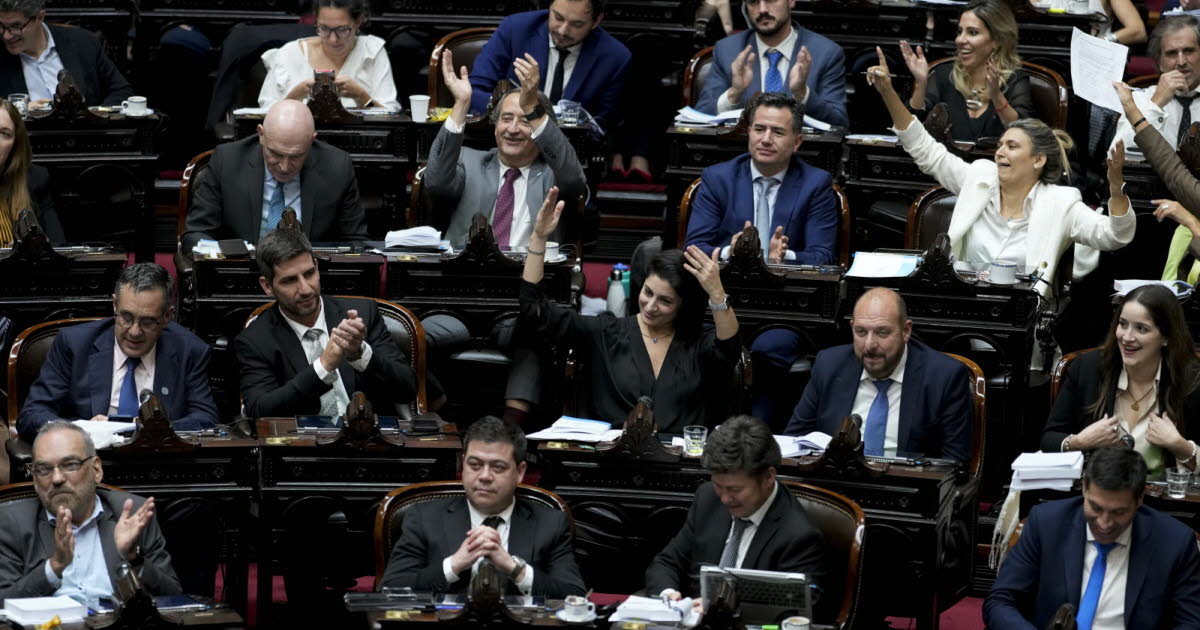Argentine lawmakers on Tuesday gave the first green light in principle to President Javier Milea’s package of ultra-liberal measures, a project that has been severely weakened since the failure of the pharaoh’s original version in parliament in February.
After a marathon of more than 20 hours, the Basic Law received 142 votes in favor, 106 against and five abstentions in the morning. This is a “general” decision, before the so-called “specific” vote on each of the articles submitted to the Chamber of Deputies.
230 discussed articles
Around 230 articles are presented for discussion instead of more than 600 original articles of the so-called “omnibus” law, with reservations on the privatization of public companies – planned 11, including Aerolineas Argentinas, instead of 44 at the beginning – or the flexibilization of labor law in a light version.
The restoration of the income tax bands abolished by the previous center-left government, as well as a battery of tax benefits, also figure in the bill, which leaves aside controversial social aspects of the text discussed in February, such as divorce reform.
Despite the agreements reached with the right-wing blocs, a vote for each of the articles is not guaranteed in the chamber, where Milei’s libertarian party is only the third group (38 MPs out of 257).
It’s also the first step before the Senate, where the arithmetic for the president’s party is even more delicate.
Complicated first months for Milea
To date, the reforms of Milei, who has been president since December, have suffered two setbacks in parliament: in February, when MPs forced the summary law to be submitted to committees. Then in March, the Senate rejected another part, the so-called “Decree on Necessity and Emergency”, a mega-decree published at the beginning of his presidency and still partially valid today.
But the promised “shock therapy” of savings is indeed in place, between the brutal devaluation of the peso (+50%), the liberalization of prices and rents, the end of subsidies for transport, energy, freezing of public construction sites, etc.
The demonstration at parliament, called by social movements and the radical left, continued until late Monday evening, but without incident, unlike the tensions and clashes at the February session.
“What the national government is doing is simply selling the homeland and destroying the population,” protested Manuel Crespo, a 29-year-old teacher.
Call for a strike on May 1 and 9
The demonstration is planned for 1ahem May Day, Labor Day, against labor reform and government austerity measures. The unions also called for a national strike on May 9, which would be the second since Milea came to power in December.
On April 24, hundreds of thousands of people across the country demonstrated against the defunding of public universities. “Our plan is working,” the president says regularly, citing the continued slowdown in inflation since he took office (from 25% a month to around 10%) and a first-quarter budget surplus, the first since 2008.
Let the MPs “drop the law (omnibus), let them drop everything, despite the politics we will still succeed,” he recently launched in challenge mode and downplayed a possible new legislative failure in advance.
Former president (2007-2015) Cristina Kirchner this weekend, in her first public intervention since the defeat of her Peronist camp (center) in the presidential election, accused Milei of causing Argentines an “unnecessary sacrifice” in the name of a balanced budget. . “What’s the point when people starve, lose their jobs and can’t make it at the end of the month? »

